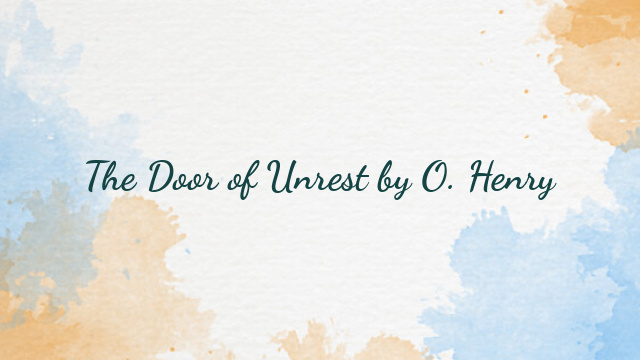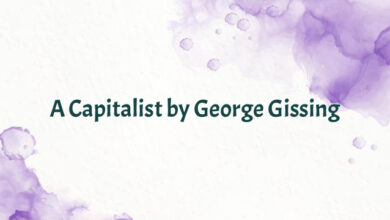
The Door of Unrest by O. Henry
I sat an hour by sun, in the editor’s room of the Montopolis Weekly Bugle. I was the editor.
The saffron rays of the declining sunlight filtered through the cornstalks in Micajah Widdup’s garden-patch, and cast an amber glory upon my paste-pot. I sat at the editorial desk in my non-rotary revolving chair, and prepared my editorial against the oligarchies. The room, with its one window, was already a prey to the twilight. One by one, with my trenchant sentences, I lopped off the heads of the political hydra, while I listened, full of kindly peace, to the home-coming cow-bells and wondered what Mrs. Flanagan was going to have for supper.
Then in from the dusky, quiet street there drifted and perched himself upon a corner of my desk old Father Time’s younger brother. His face was beardless and as gnarled as an English walnut. I never saw clothes such as he wore. They would have reduced Joseph’s coat to a monochrome. But the colours were not the dyer’s. Stains and patches and the work of sun and rust were responsible for the diversity. On his coarse shoes was the dust, conceivably, of a thousand leagues. I can describe him no further, except to say that he was little and weird and old — old I began to estimate in centuries when I saw him. Yes, and I remember that there was an odour, a faint odour like aloes, or possibly like myrrh or leather; and I thought of museums.
And then I reached for a pad and pencil, for business is business, and visits of the oldest inhabitants are sacred and honourable, requiring to be chronicled.
“I am glad to see you, sir,” I said. “I would offer you a chair, but — you see, sir,” I went on, “I have lived in Montopolis only three weeks, and I have not met many of our citizens.” I turned a doubtful eye upon his dust-stained shoes, and concluded with a newspaper phrase, “I suppose that you reside in our midst?”
My visitor fumbled in his raiment, drew forth a soiled card, and handed it to me. Upon it was written, in plain but unsteadily formed characters, the name “Michob Ader.”
“I am glad you called, Mr. Ader,” I said. “As one of our older citizens, you must view with pride the recent growth and enterprise of Montopolis. Among other improvements, I think I can promise that the town will now be provided with a live, enterprising newspa–“
“Do ye know the name on that card?” asked my caller, interrupting me.
“It is not a familiar one to me,” I said.
Again he visited the depths of his ancient vestments. This time he brought out a torn leaf of some book or journal, brown and flimsy with age. The heading of the page was the Turkish Spy in old-style type; the printing upon it was this:
“There is a man come to Paris in this year 1643 who pretends to have lived these sixteen hundred years. He says of himself that he was a shoemaker in Jerusalem at the time of the Crucifixion; that his name is Michob Ader; and that when Jesus, the Christian Messias, was condemned by Pontius Pilate, the Roman president, he paused to rest while bearing his cross to the place of crucifixion before the door of Michob Ader. The shoemaker struck Jesus with his fist, saying: ‘Go; why tarriest thou?’ The Messias a nswered him: ‘I indeed am going; but thou shalt tarry until I come’; thereby condemning him to live until the day of judgment. He lives forever, but at the end of every hundred years he falls into a fit or trance, on recovering from which he finds himself in the same state of youth in which he was when Jesus suffered, being then about thirty years of age.
“Such is the story of the Wandering Jew, as told by Michob Ader, who relates –” Here the printing ended.
I must have muttered aloud something to myself about the Wandering Jew, for the old man spake up, bitterly and loudly.
“‘Tis a lie,” said he, “like nine tenths of what ye call history. ‘Tis a Gentile I am, and no Jew. I am after footing it out of Jerusalem, my son; but if that makes me a Jew, then everything that comes out of a bottle is babies’ milk. Ye have my name on the card ye hold; and ye have read the bit of paper they call the Turkish Spy that printed the news when I stepped into their office on the 12th day of June, in the year 1643, just as I have called upon ye to-day.”
I laid down my pencil and pad. Clearly it would not do. Here was an item for the local column of the Bugle that — but it would not do. Still, fragments of the impossible “personal” began to flit through my conventionalized brain. “Uncle Michob is as spry on his legs as a young chap of only a thousand or so.” “Our venerable caller relates with’ pride that George Wash — no, Ptolemy the Great — once dandled him on his knee at his father’s house.” “Uncle Michob says that our wet spring was nothing in comparison with the dampness that ruined the crops around Mount Ararat when he was a boy –” But no, no — it would not do.
I was trying to think of some conversational subject with which to interest my visitor, and was hesitating between walking matches and the Pliocene age, when the old man suddenly began to weep poignantly and distressfully.
“Cheer up, Mr. Ader,” I said, a little awkwardly; “this matter may blow over in a few hundred years more. There has already been a decided reaction in favour of Judas Iscariot and Colonel Burr and the celebrated violinist, Signor Nero. This is the age of whitewash. You must not allow yourself to become down-hearted.”
Unknowingly, I had struck a chord. The old man blinked belligerently through his senile tears.
“‘Tis time,” he said, “that the liars be doin’ justice to somebody. Yer historians are no more than a pack of old women gabblin’ at a wake. A finer man than the Imperor Nero niver wore sandals. Man, I was at the burnin’ of Rome. I knowed the Imperor well, for in them days I was a well-known char-acter. In thim days they had rayspect for a man that lived forever.
“But ’twas of the Imperor Nero I was goin’ to tell ye. I struck into Rome, up the Appian Way, on the night of July the 16th, the year 64. I had just stepped down by way of Siberia and Afghanistan; and one foot of me had a frost-bite, and the other a blister burned by the sand of the desert; and I was feelin’ a bit blue from doin’ patrol duty from the North Pole down to the Last Chance corner in Patagonia, and bein’ miscalled a Jew in the bargain. Well, I’m tellin’ ye I was passin’ the Circus Maximus, and it was dark as pitch over the way, and then I heard somebody sing out, ‘Is that you, Michob?’
“Over ag’inst the wall, hid out amongst a pile of barrels and old dry-goods boxes, was the Imperor Nero wid his togy wrapped around his toes, smokin’ a long, black segar.
“‘Have one, Michob?’ says he.
“‘None of the weeds for me,’ says I — ‘nayther pipe nor segar. What’s the use,’ says I, ‘of smokin’ when ye’ve not got the ghost of a chance of killin’ yeself by doin’ it?’
“‘True for ye, Michob Ader, my perpetual Jew,’ says the Imperor; ‘ye’re not always wandering. Sure, ’tis danger gives the spice of our pleasures — next to their bein’ forbidden.’
“‘And for what,’ says I, ‘do ye smoke be night in dark places widout even a cinturion in plain clothes to attend ye?’
“‘Have ye ever heard, Michob,’ says the Imperor, ‘of predestinarianism?’
“‘I’ve had the cousin of it,’ says I. ‘I’ve been on the trot with pedestrianism for many a year, and more to come, as ye well know.’
“‘The longer word,’ says me friend Nero, ‘is the tachin’ of this new sect of people they call the Christians. ‘Tis them that’s raysponsible for me smokin’ be night in holes and corners of the dark.’
“And then I sets down and takes off a shoe and rubs me foot that is frosted, and the Imperor tells me about it. It seems that since I passed that way before, the Imperor had mandamused the Impress wid a divorce suit, and Misses Poppaea, a cilibrated lady, was ingaged, widout riferences, as housekeeper at the palace. ‘All in one day,’ says the Imperor, ‘she puts up new lace windy-curtains in the palace and joins the anti-tobacco society, and whin I feels the need of a smoke I must be after sneakin’ out to these piles of lumber in the dark.’ So there in the dark me and the Imperor sat, and I told him of me travels. And when they say the Imperor was an incindiary, they lie. ‘Twas that night the fire started that burnt the city. ‘Tis my opinion that it began from a stump of segar that he threw down among the boxes. And ’tis a lie that he fiddled. He did all he could for six days to stop it, sir.”
And now I detected a new flavour to Mr. Michob Ader. It had not been myrrh or balm or hyssop that I had smelled. The emanation was the odour of bad whiskey — and, worse still, of low comedy — the sort that small humorists manufacture by clothing the grave and reverend things of legend and history in the vulgar, topical frippery that passes for a certain kind of wit. Michob Ader as an impostor, claiming nineteen hundred years, and playing his part with the decency of respectable lunacy, I could endure; but as a tedious wag, cheapening his egregious story with song-book levity, his importance as an entertainer grew less.
And then, as if he suspected my thoughts, he suddenly shifted his key.
“You’ll excuse me, sir,” he whined, “but sometimes I get a little mixed in my head. I am a very old man; and it is hard to remember everything.”
I knew that he was right, and that I should not try to reconcile him with Roman history; so I asked for news concerning other ancients with whom he had walked familiar.
Above my desk hung an engraving of Raphael’s cherubs. You could yet make out their forms, though the dust blurred their outlines strangely.
“Ye calls them ‘cher-rubs’,” cackled the old man. “Babes, ye fancy they are, with wings. And there’s one wid legs and a bow and arrow that ye call Cupid — I know where they was found. The great-great-great-grandfather of thim all was a billy-goat. Bein’ an editor, sir, do ye happen to know where Solomon s Temple stood?”
I fancied that it was in — in Persia? Well, I did not know.
“‘Tis not in history nor in the Bible where it was. But I saw it, meself. The first pictures of cher-rubs and cupids was sculptured upon thim walls and pillars. Two of the biggest, sir, stood in the adytum to form the baldachin over the Ark. But the wings of thim sculptures was intindid for horns. And the faces was the faces of goats. Ten thousand goats there was in and about the temple. And your cher-rubs was billy-goats in the days of King Solomon, but the painters misconstrued the horns into wings.
“And I knew Tamerlane, the lame Timour, sir, very well. I saw him at Keghut and at Zaranj. He was a little man no larger than yerself, with hair the colour of an amber pipe stem. They buried him at Samarkand I was at the wake, sir. Oh, he was a fine-built man in his coffin, six feet long, with black whiskers to his face. And I see ’em throw turnips at the Imperor Vispacian in Africa. All over the world I have tramped, sir, without the body of me findin’ any rest. ‘Twas so commanded I saw Jerusalem destroyed, and Pompeii go up in the fireworks; and I was at the coronation of Charlemagne and the lynchin’ of Joan of Arc. And everywhere I go there comes storms and revolutions and plagues and fires. ‘Twas so commanded. Ye have heard of the Wandering Jew. ‘Tis all so, except that divil a bit am I a Jew. But history lies, as I have told ye. Are ye quite sure, sir, that ye haven’t a drop of whiskey convenient? Ye well know that I have many miles of walking before me.”
“I have none,” said I, “and, if you please, I am about to leave for my supper.”
I pushed my chair back creakingly. This ancient landlubber was becoming as great an affliction as any cross-bowed mariner. He shook a musty effluvium from his piebald clothes, overturned my inkstand, and went on with his insufferable nonsense.
“I wouldn’t mind it so much,” he complained, “if it wasn’t for the work I must do on Good Fridays. Ye know about Pontius Pilate, sir, of course. His body, whin he killed himself, was pitched into a lake on the Alps mountains. Now, listen to the job that ’tis mine to perform on the night of ivery Good Friday. The ould divil goes down in the pool and drags up Pontius, and the water is bilin’ and spewin’ like a wash pot. And the ould divil sets the body on top of a throne on the rocks, and thin comes me share of the job. Oh, sir, ye would pity me thin — ye would pray for the poor Wandering Jew that niver was a Jew if ye could see the horror of the thing that I must do. ‘Tis I that must fetch a bowl of water and kneel down before it till it washes its hands. I declare to ye that Pontius Pilate, a man dead two hundred years, dragged up with the lake slime coverin’ him and fishes wrigglin’ inside of him widout eyes, and in the discomposition of the body, sits there, sir, and washes his hands in the bowl I hold for him on Good Fridays. ‘Twas so commanded.”
Clearly, the matter had progressed far beyond the scope of the Bugle’s local column. There might have been employment here for the alienist or for those who circulate the pledge; but I had had enough of it. I got up, and repeated that I must go.
At this he seized my coat, grovelled upon my desk, and burst again into distressful weeping. Whatever it was about, I said to myself that his grief was genuine.
“Come now, Mr. Ader,” I said, soothingly; “what is the matter?”
The answer came brokenly through his racking sobs:
“Because I would not…let the poor Christ…rest…upon the step.”
His hallucination seemed beyond all reasonable answer; yet the effect of it upon him scarcely merited disrespect. But I knew nothing that might assuage it; and I told him once more that both of us should be leaving the office at once.
Obedient at last, he raised himself from my dishevelled desk, and permitted me to half lift him to the floor. The gale of his grief had blown away his words; his freshet of tears had soaked away the crust of his grief. Reminiscence died in him — at least, the coherent part of it.
“‘Twas me that did it,” he muttered, as I led him toward the door — “me, the shoemaker of Jerusalem.”
I got him to the sidewalk, and in the augmented light I saw that his face was seared and lined and warped by a sadness almost incredibly the product of a single lifetime.
And then high up in the firmamental darkness we heard the clamant cries of some great, passing birds. My Wandering Jew lifted his hand, with side-tilted head.
“The Seven Whistlers!” he said, as one introduces well-known friends.
“Wild geese,” said I; “but I confess that their number is beyond me.”
“They follow me everywhere,” he said. “‘Twas so commanded. What ye hear is the souls of the seven Jews that helped with the Crucifixion. Sometimes they’re plovers and sometimes geese, but ye’ll find them always flyin’ where I go.”
I stood, uncertain how to take my leave. I looked down the street, shuffled my feet, looked back again — and felt my hair rise. The old man had disappeared.
And then my capillaries relaxed, for I dimly saw him footing it away through the darkness. But he walked so swiftly and silently and contrary to the gait promised by his age that my composure was not all restored, though I knew not why.
That night I was foolish enough to take down some dust-covered volumes from my modest shelves. I searched “Hermippus Redivvus” and “Salathiel” and the “Pepys Collection” in vain. And then in a book called “The Citizen of the World,” and in one two centuries old, I came upon what I desired. Michob Ader had indeed come to Paris in the year 1643, and related to the Turkish Spy an extraordinary story. He claimed to be the Wandering Jew, and that —
But here I fell asleep, for my editorial duties had not been light that day.
Judge Hoover was the Bugle’s candidate for congress. Having to confer with him, I sought his home early the next morning; and we walked together down town through a little street with which I was unfamiliar.
“Did you ever hear of Michob Ader?” I asked him, smiling.
“Why, yes,” said the judge. “And that reminds me of my shoes he has for mending. Here is his shop now.”
Judge Hoover stepped into a dingy, small shop. I looked up at the sign, and saw “Mike O’Bader, Boot and Shoe Maker,” on it. Some wild geese passed above, honking clearly. I scratched my ear and frowned, and then trailed into the shop.
There sat my Wandering Jew on his shoemaker’s bench, trimming a half-sole. He was drabbled with dew, grass-stained, unkempt, and miserable; and on his face was still the unexplained wretchedness, the problematic sorrow, the esoteric woe, that had been written there by nothing less, it seemed, than the stylus of the centuries.
Judge Hoover inquired kindly concerning his shoes. The old shoemaker looked up, and spoke sanely enough. He had been ill, he said, for a few days. The next day the shoes would be ready. He looked at me, and I could see that I had no place in his memory. So out we went, and on our way.
“Old Mike,” remarked the candidate, “has been on one of his sprees. He gets crazy drunk regularly once a month. But he’s a good shoemaker.”
“What is his history?” I inquired.
“Whiskey,” epitomized Judge Hoover. “That explains him.”
I was silent, but I did not accept the explanation. And so, when I had the chance, I asked old man Sellers, who browsed daily on my exchanges.
“Mike O’Bader,” said he, “was makin’ shoes in Montopolis when I come here goin’ on fifteen year ago. I guess whiskey’s his trouble. Once a month he gets off the track, and stays so a week. He’s got a rigmarole somethin’ about his bein’ a Jew pedler that he tells ev’rybody. Nobody won’t listen to him any more. When he’s sober he ain’t sich a fool — he’s got a sight of books in the back room of his shop that he reads. I guess you can lay all his trouble to whiskey.”
But again I would not. Not yet was my Wandering Jew rightly construed for me. I trust that women may not be allowed a title to all the curiosity in the world. So when Montopolis’s oldest inhabitant (some ninety score years younger than Michob Ader) dropped in to acquire promulgation in print, I siphoned his perpetual trickle of reminiscence in the direction of the uninterpreted maker of shoes.
Uncle Abner was the Complete History of Montopolis, bound in butternut.
“O’Bader,” he quavered, “come here in ’69. He was the first shoemaker in the place. Folks generally considers him crazy at times now. But he don’t harm nobody. I s’pose drinkin’ upset his mind — yes, drinkin’ very likely done it. It’s a powerful bad thing, drinkin’. I’m an old, old man, sir, and I never see no good in drinkin’.”
I felt disappointment. I was willing to admit drink in the case of my shoemaker, but I preferred it as a recourse instead of a cause. Why had he pitched upon his perpetual, strange note of the Wandering Jew? Why his unutterable grief during his aberration? I could not yet accept whiskey as an explanation.
“Did Mike O’Bader ever have a great loss or trouble of any kind?” I asked.
“Lemme see! About thirty year ago there was somethin’ of the kind, I recollect. Montopolis, sir, in them days used to be a mighty strict place.
“Well, Mike O’Bader had a daughter then — a right pretty girl. She was too gay a sort for Montopolis so one day she slips off to another town and runs away with a circus. It was two years before she comes back, all fixed up in fine clothes and rings and jewellery, to see Mike. He wouldn’t have nothin’ to do with her, so she stays around town awhile, anyway. I reckon the men folks wouldn’t have raised no objections, but the women egged ’em on to order her to leave town. But she had plenty of spunk, and told ’em to mind their own business.
“So one night they decided to run her away. A crowd of men and women drove her out of her house, and chased her with sticks and stones. She run to her father’s door, callin’ for help. Mike opens it, and when he sees who it is he hits her with his fist and knocks her down and shuts the door.
“And then the crowd kept on chunkin’ her till she run clear out of town. And the next day they finds her drowned dead in Hunter’s mill pond. I mind it all now. That was thirty year ago.”
I leaned back in my non-rotary revolving chair and nodded gently, like a mandarin, at my paste-pot.
“When old Mike has a spell,” went on Uncle Abner, tepidly garrulous, “he thinks he’s the Wanderin’ Jew.”
“He is,” said I, nodding away.
And Uncle Abner cackled insinuatingly at the editor’s remark, for he was expecting at least a “stickful” in the “Personal Notes” of the Bugle.




